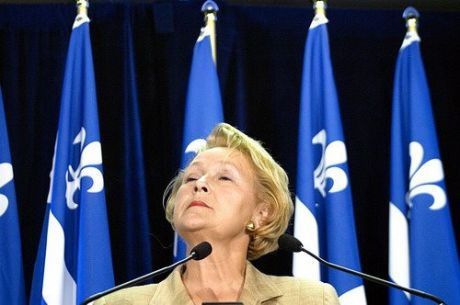News
You are here
Parti Quebecois continues its dangerous games

August 22, 2013
With the announcement that they will table legislation this fall to ban public servants from wearing "ostentatious religious symbols", the PQ are continuing their engagement in a very dangerous game: a game designed to distract the public from their mismanagement and neoliberal agenda, while taking Quebec down a path of attacking the individual rights of minorities to express their religious beliefs.
The PQ has proven over and over during the past year that it has the same neoliberal agenda as the Liberal government it replaced. And, with a 63 per cent unpopularity rating, and a distant second place in the polls, it could be a short lived minority government.
Austerity
The PQ has failed to deliver for Quebeckers on every important front. Health care remains inaccessible and private clinics are springing up for everything from sleep deprivation to blood tests. Hundreds of millions of dollars have been cut from education and post-secondary, resulting in a plethora of user fees and increased municipal and school board taxes. Meanwhile Hydro fees are increasing, and the health care tax remains despite a promise to eliminate it. Welfare payment cuts to women and men between 55 and 58 and to couples with children have also been announced.
In the North, Marois reduced funding on mining infrastructure and investment, but is maintaining the essential core of the Liberal Plan Nord--a paln to gut the north's resources from Indigenous people, while slashing the promised investments in social infrastructure for Northern communities.
Scapegoat
In this context, the PQ "Values Charter," the specific contents of which, at the time of writing, are still unofficial, is obviously an attempt at drumming up populist support from the worst of the orthodox secularists and the ethnic nationalists. So far it seems that the plan is to ban the wearing of religious symbols by public servants, but to leave the cross hanging in the National Assembly due to its "cultural" significance.
Quebec has a long history of being oppressed by the Canadian state, including claims that Quebec is more racist or backwards than English Canada. But like Stephen Harper declaring "the greatest threat is Islamicism" or Jason Kenney banning women from wearing the niqab during citizenship ceremonies, the PQ is scapegoating Muslim women to distract from austerity.
As Benoit Renaud observed on this site in June of this year, "in fact the government's purpose is not to contribute to the debate but rather to develop a new strategy to counter the decline in their popular support, a logical consequence of their neoliberal governance. Like other Western governments on the ropes in the recent past (for example, Sarkozy's in France), the Marois regime hopes to rally support around xenophobic panic disguised as a fight for secularism and/or national identity."
Reaction
There is no question who this "Values Charter" is targeting: immigrant women. But the discussion has evolved in Quebec since the Bouchard-Taylor Commission, which recommended in 2007 that Quebec adopt a policy of open secularism and interculturalism. The racist comments on news sites are now far better balanced by social media discussion of how inappropriate and unwelcome this legislation is. The response has been quick from some quarters; women who wear hijab and work in subsidized daycare facilities have been prominently featured in news coverage, promising to defy the ban.
All three parties in the National Assembly oppose it as well. The idea may already be dead in the water considering the minority status of the PQ. But that won't stop the PQ from trying to use it to distract Quebeckers from the real issues of the day: access to health care, unemployment, and the environment.
Several mass organizations in Quebec have decent positions on the issue of "religious symbols," including the Fédération autonome de l'enseignement (FAE, the teachers' union in Montreal and Gatineau); the Féderation des femmes du Québec; and Fédération interprofessionnelle de la santé (FIQ, the main nurses union), as well as Québec solidaire and a grassroots group called Association des Musulmans et Arabes pour la laïcité (AMAL). We can hope for action, or at least reaction, from those fronts in coming days.
Section:
Topics:









